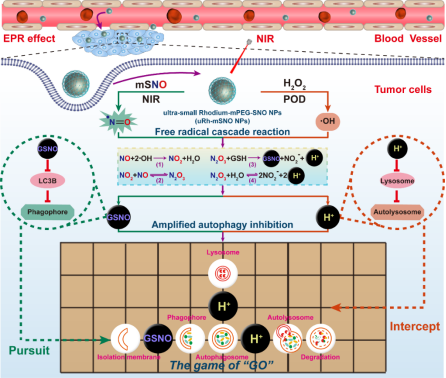Autophagy, a specific degradation pathway depends on lysosome in eucaryon, has emerging significance in many diseases. Specifically, autophagy supplies the demand for cellular energy and reduces the sensitivity of tumor cells thus enhance the drug resistance in cancer treatments. Hence, autophagy inhibition coule be a potential method for cancer treatment. In addition, autophagy plays a role depends on the complete dynamic process. Although, some methods could inhibit autophagy via a specific process, several disadvantages including low efficiency and side effect still impede their applications. Herein, inspired by the game of “GO”, the research group of Associate Prof. Nan Li proposed a “Pursuit and Interception” strategy for amplified autophagy inhibition. They combined the prodrug of nitric oxide with ultra-small rhodium nanopaticles (uRh-mSNO NPs), reveal a free radical cascade reaction triggered by near-infrared (NIR) laser irradiation, ultimately generating GSNO and H+, which could achieve amplified autophagy inhibition for tumor therapy (Scheme 1). Based on the free radical cascade reaction, on one hand, GSNO (black pieces) could inhibit the transformation of LC3B, which further block the process of phagophore formation (white pieces). On the other hand, plenty supplement of H+ (black pieces) could cause dysfunction of lysosome via destructing the membrane permeability to hinder the fusion process between autophagosomes and lysosome, thus inducing amplified autophagy inhibition by the strategy of “pursuit and interception”. This project may provide a method for further explore the effect of autophagy in tumor.

Scheme 1. A “pursuit and interception” strategy of amplified autophagy inhibition for tumor therapy based on free radical cascade reaction
Recently, the research group of Associate Prof. Nan Li published a research article entitled “A ‘pursuit and interception’ strategy of amplified autophagy inhibition for tumor therapy based on ultra-small Rh nanoparticles” in Chemical Engineering Journal (IF=13.2). Moreover, the School of Pharmaceutical Science and Technology (SPST) of Tianjin University is the first completion unit of the thesis. Xiaoyang Liang, a PhD student from SPST, is the first author. Associate Prof. Nan Li is the solo corresponding author of the paper. Attending Physician, Yanhui Ji, from the Department of Nuclear Medicine of Tianjin Medical University General Hospital and Associate Dean, Long Binh Vong, from the School of Biomedical Engineering of Vietnam National University Ho Chi Minh City (VNU-HCMC) made important contributions to this project. The project was assisted by the members of Instrumental Analysis Center (IAC) of SPST.
Paper link:https://doi.org/10.1016/j.cej.2022.136379

